冀教版英语八年级上册 Unit 2 My Favourite School Subject 单元练习(含解析)
文档属性
| 名称 | 冀教版英语八年级上册 Unit 2 My Favourite School Subject 单元练习(含解析) | 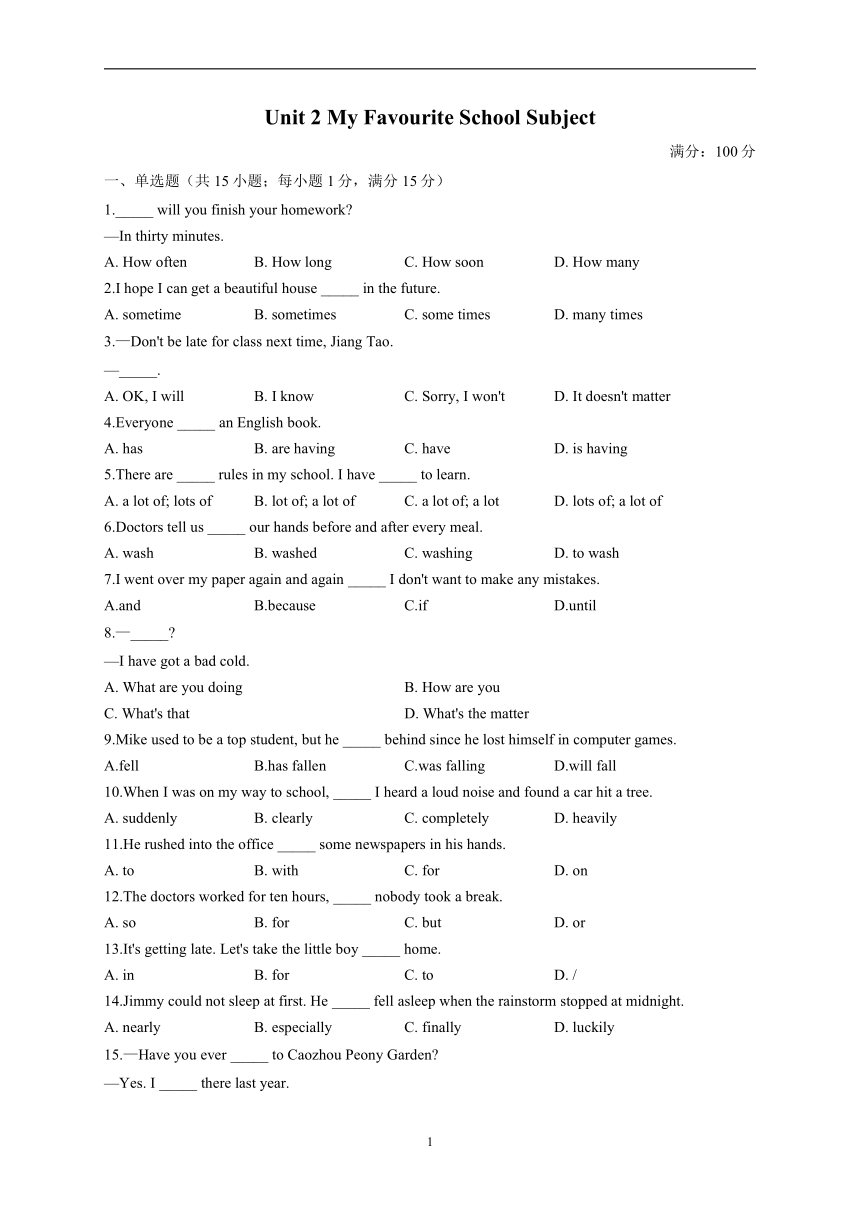 | |
| 格式 | docx | ||
| 文件大小 | 84.3KB | ||
| 资源类型 | 教案 | ||
| 版本资源 | 冀教版 | ||
| 科目 | 英语 | ||
| 更新时间 | 2022-08-16 11:26:23 | ||
图片预览

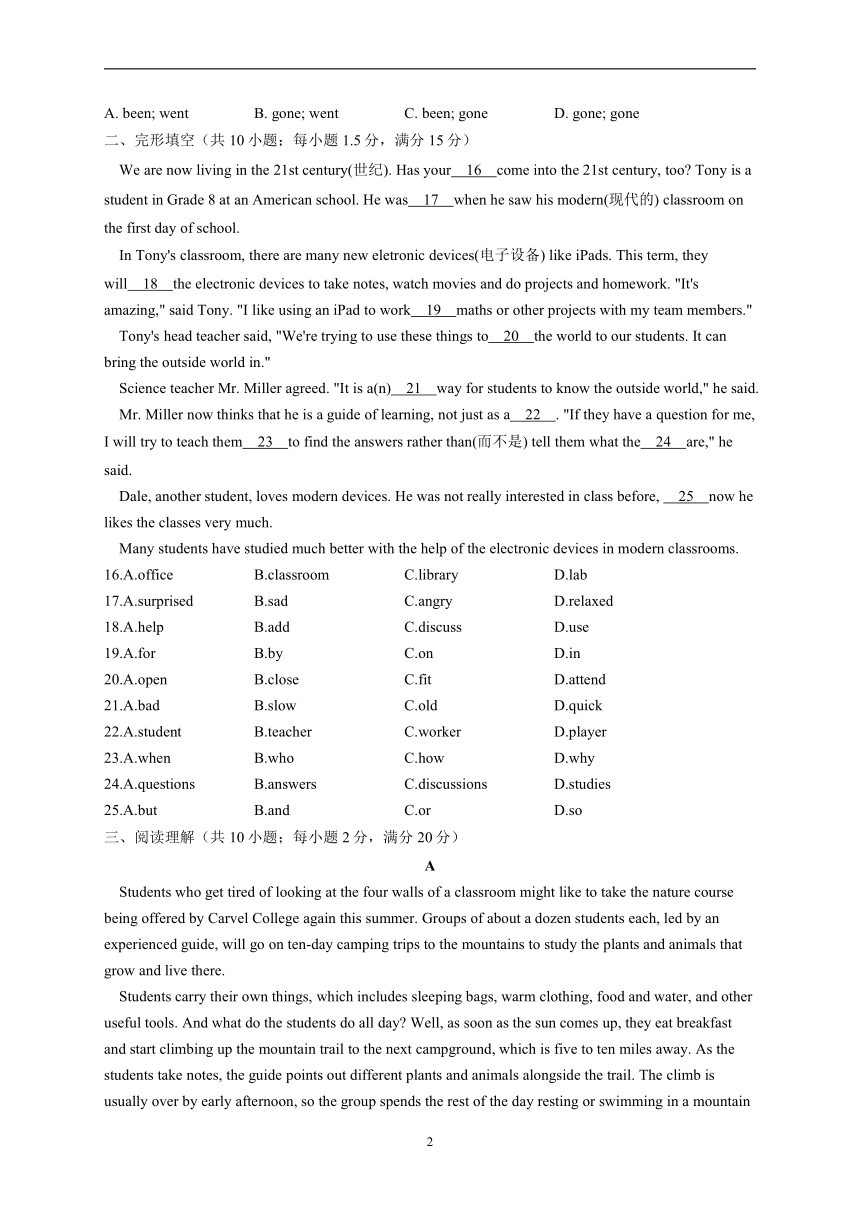
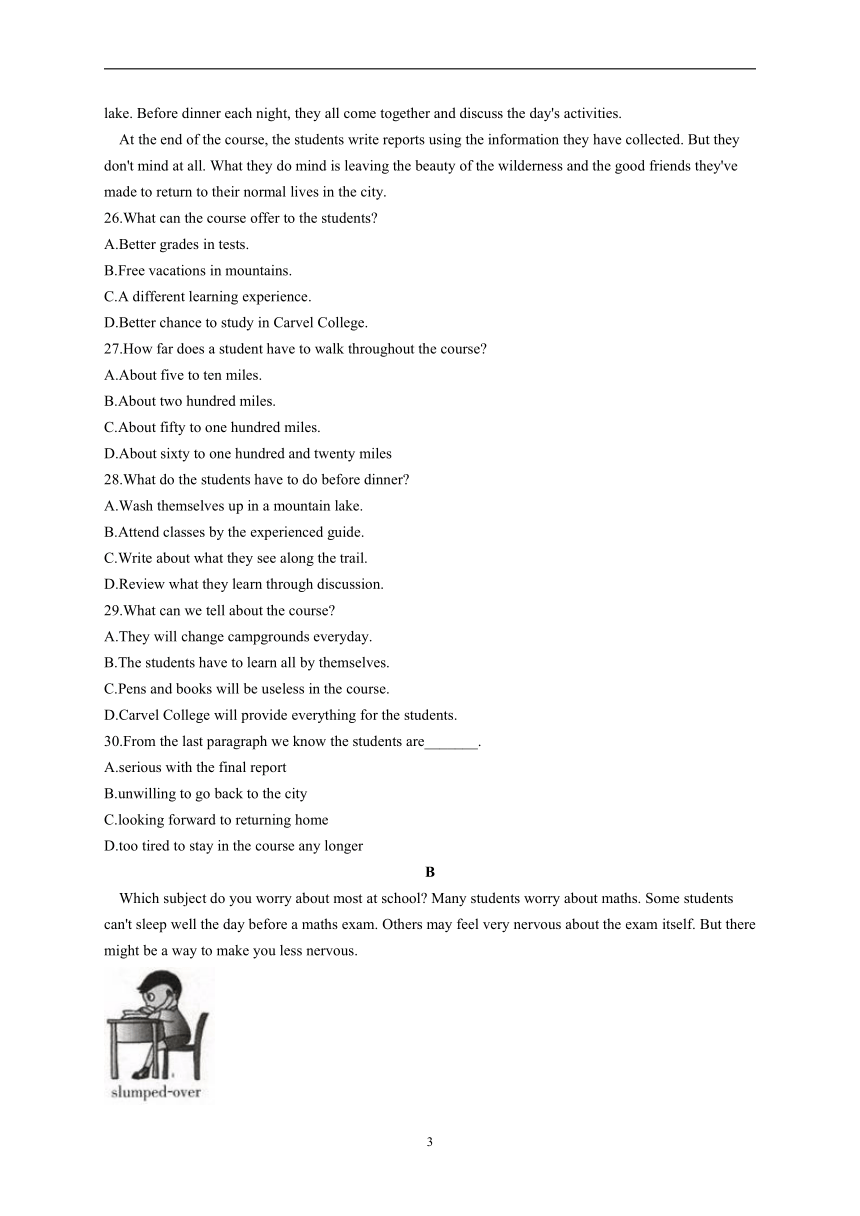
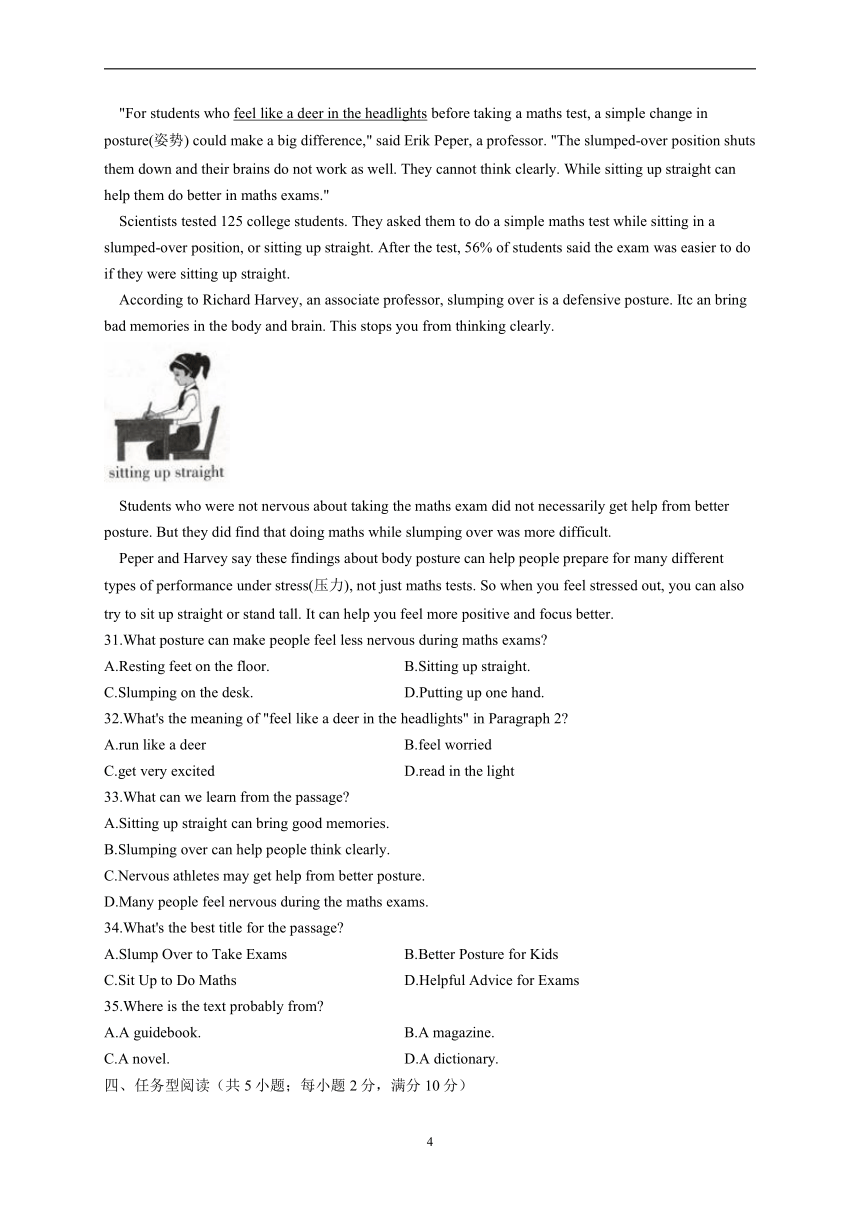
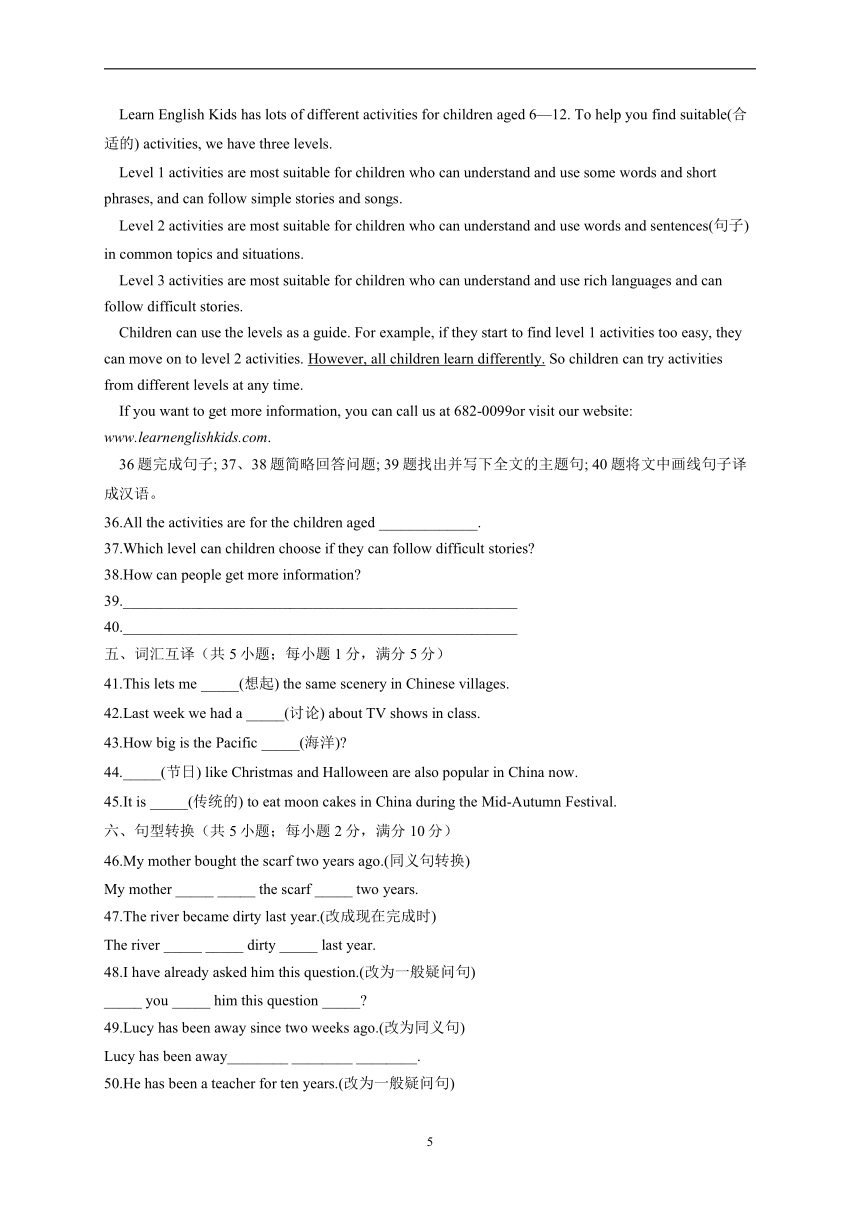
文档简介
Unit 2 My Favourite School Subject
满分:100分
一、单选题(共15小题;每小题1分,满分15分)
1._____ will you finish your homework
—In thirty minutes.
A. How often B. How long C. How soon D. How many
2.I hope I can get a beautiful house _____ in the future.
A. sometime B. sometimes C. some times D. many times
3.—Don't be late for class next time, Jiang Tao.
—_____.
A. OK, I will B. I know C. Sorry, I won't D. It doesn't matter
4.Everyone _____ an English book.
A. has B. are having C. have D. is having
5.There are _____ rules in my school. I have _____ to learn.
A. a lot of; lots of B. lot of; a lot of C. a lot of; a lot D. lots of; a lot of
6.Doctors tell us _____ our hands before and after every meal.
A. wash B. washed C. washing D. to wash
7.I went over my paper again and again _____ I don't want to make any mistakes.
A.and B.because C.if D.until
8.—_____
—I have got a bad cold.
A. What are you doing B. How are you
C. What's that D. What's the matter
9.Mike used to be a top student, but he _____ behind since he lost himself in computer games.
A.fell B.has fallen C.was falling D.will fall
10.When I was on my way to school, _____ I heard a loud noise and found a car hit a tree.
A. suddenly B. clearly C. completely D. heavily
11.He rushed into the office _____ some newspapers in his hands.
A. to B. with C. for D. on
12.The doctors worked for ten hours, _____ nobody took a break.
A. so B. for C. but D. or
13.It's getting late. Let's take the little boy _____ home.
A. in B. for C. to D. /
14.Jimmy could not sleep at first. He _____ fell asleep when the rainstorm stopped at midnight.
A. nearly B. especially C. finally D. luckily
15.—Have you ever _____ to Caozhou Peony Garden
—Yes. I _____ there last year.
A. been; went B. gone; went C. been; gone D. gone; gone
二、完形填空(共10小题;每小题1.5分,满分15分)
We are now living in the 21st century(世纪). Has your 16 come into the 21st century, too Tony is a student in Grade 8 at an American school. He was 17 when he saw his modern(现代的) classroom on the first day of school.
In Tony's classroom, there are many new eletronic devices(电子设备) like iPads. This term, they will 18 the electronic devices to take notes, watch movies and do projects and homework. "It's amazing," said Tony. "I like using an iPad to work 19 maths or other projects with my team members."
Tony's head teacher said, "We're trying to use these things to 20 the world to our students. It can bring the outside world in."
Science teacher Mr. Miller agreed. "It is a(n) 21 way for students to know the outside world," he said.
Mr. Miller now thinks that he is a guide of learning, not just as a 22 . "If they have a question for me, I will try to teach them 23 to find the answers rather than(而不是) tell them what the 24 are," he said.
Dale, another student, loves modern devices. He was not really interested in class before, 25 now he likes the classes very much.
Many students have studied much better with the help of the electronic devices in modern classrooms.
16.A.office B.classroom C.library D.lab
17.A.surprised B.sad C.angry D.relaxed
18.A.help B.add C.discuss D.use
19.A.for B.by C.on D.in
20.A.open B.close C.fit D.attend
21.A.bad B.slow C.old D.quick
22.A.student B.teacher C.worker D.player
23.A.when B.who C.how D.why
24.A.questions B.answers C.discussions D.studies
25.A.but B.and C.or D.so
三、阅读理解(共10小题;每小题2分,满分20分)
A
Students who get tired of looking at the four walls of a classroom might like to take the nature course being offered by Carvel College again this summer. Groups of about a dozen students each, led by an experienced guide, will go on ten-day camping trips to the mountains to study the plants and animals that grow and live there.
Students carry their own things, which includes sleeping bags, warm clothing, food and water, and other useful tools. And what do the students do all day Well, as soon as the sun comes up, they eat breakfast and start climbing up the mountain trail to the next campground, which is five to ten miles away. As the students take notes, the guide points out different plants and animals alongside the trail. The climb is usually over by early afternoon, so the group spends the rest of the day resting or swimming in a mountain lake. Before dinner each night, they all come together and discuss the day's activities.
At the end of the course, the students write reports using the information they have collected. But they don't mind at all. What they do mind is leaving the beauty of the wilderness and the good friends they've made to return to their normal lives in the city.
26.What can the course offer to the students
A.Better grades in tests.
B.Free vacations in mountains.
C.A different learning experience.
D.Better chance to study in Carvel College.
27.How far does a student have to walk throughout the course
A.About five to ten miles.
B.About two hundred miles.
C.About fifty to one hundred miles.
D.About sixty to one hundred and twenty miles
28.What do the students have to do before dinner
A.Wash themselves up in a mountain lake.
B.Attend classes by the experienced guide.
C.Write about what they see along the trail.
D.Review what they learn through discussion.
29.What can we tell about the course
A.They will change campgrounds everyday.
B.The students have to learn all by themselves.
C.Pens and books will be useless in the course.
D.Carvel College will provide everything for the students.
30.From the last paragraph we know the students are_______.
A.serious with the final report
B.unwilling to go back to the city
C.looking forward to returning home
D.too tired to stay in the course any longer
B
Which subject do you worry about most at school Many students worry about maths. Some students can't sleep well the day before a maths exam. Others may feel very nervous about the exam itself. But there might be a way to make you less nervous.
"For students who feel like a deer in the headlights before taking a maths test, a simple change in posture(姿势) could make a big difference," said Erik Peper, a professor. "The slumped-over position shuts them down and their brains do not work as well. They cannot think clearly. While sitting up straight can help them do better in maths exams."
Scientists tested 125 college students. They asked them to do a simple maths test while sitting in a slumped-over position, or sitting up straight. After the test, 56% of students said the exam was easier to do if they were sitting up straight.
According to Richard Harvey, an associate professor, slumping over is a defensive posture. Itc an bring bad memories in the body and brain. This stops you from thinking clearly.
Students who were not nervous about taking the maths exam did not necessarily get help from better posture. But they did find that doing maths while slumping over was more difficult.
Peper and Harvey say these findings about body posture can help people prepare for many different types of performance under stress(压力), not just maths tests. So when you feel stressed out, you can also try to sit up straight or stand tall. It can help you feel more positive and focus better.
31.What posture can make people feel less nervous during maths exams
A.Resting feet on the floor. B.Sitting up straight.
C.Slumping on the desk. D.Putting up one hand.
32.What's the meaning of "feel like a deer in the headlights" in Paragraph 2
A.run like a deer B.feel worried
C.get very excited D.read in the light
33.What can we learn from the passage
A.Sitting up straight can bring good memories.
B.Slumping over can help people think clearly.
C.Nervous athletes may get help from better posture.
D.Many people feel nervous during the maths exams.
34.What's the best title for the passage
A.Slump Over to Take Exams B.Better Posture for Kids
C.Sit Up to Do Maths D.Helpful Advice for Exams
35.Where is the text probably from
A.A guidebook. B.A magazine.
C.A novel. D.A dictionary.
四、任务型阅读(共5小题;每小题2分,满分10分)
Learn English Kids has lots of different activities for children aged 6—12. To help you find suitable(合适的) activities, we have three levels.
Level 1 activities are most suitable for children who can understand and use some words and short phrases, and can follow simple stories and songs.
Level 2 activities are most suitable for children who can understand and use words and sentences(句子) in common topics and situations.
Level 3 activities are most suitable for children who can understand and use rich languages and can follow difficult stories.
Children can use the levels as a guide. For example, if they start to find level 1 activities too easy, they can move on to level 2 activities. However, all children learn differently. So children can try activities from different levels at any time.
If you want to get more information, you can call us at 682-0099or visit our website: www..
36题完成句子; 37、38题简略回答问题; 39题找出并写下全文的主题句; 40题将文中画线句子译成汉语。
36.All the activities are for the children aged _____________.
37.Which level can children choose if they can follow difficult stories
38.How can people get more information
39.____________________________________________________
40.____________________________________________________
五、词汇互译(共5小题;每小题1分,满分5分)
41.This lets me _____(想起) the same scenery in Chinese villages.
42.Last week we had a _____(讨论) about TV shows in class.
43.How big is the Pacific _____(海洋)
44._____(节日) like Christmas and Halloween are also popular in China now.
45.It is _____(传统的) to eat moon cakes in China during the Mid-Autumn Festival.
六、句型转换(共5小题;每小题2分,满分10分)
46.My mother bought the scarf two years ago.(同义句转换)
My mother _____ _____ the scarf _____ two years.
47.The river became dirty last year.(改成现在完成时)
The river _____ _____ dirty _____ last year.
48.I have already asked him this question.(改为一般疑问句)
_____ you _____ him this question _____
49.Lucy has been away since two weeks ago.(改为同义句)
Lucy has been away________ ________ ________.
50.He has been a teacher for ten years.(改为一般疑问句)
________ ________ ________ a teacher for ten years
七、书面表达(共1小题;满分25分)
假设你是八年级三班来中国学习的交换生Jim。你现在正学习很多科目, 在这些学科中, 你最喜欢哪科呢 请给你的父母写封邮件告诉他们。
提示: (1)What is your favourite subject
(2) Why do you like it best
(3)What do you learn from it
(4)...
要求: (1)短文须包括提示中的三个要点和一个补充要点, 可适当发挥;
(2)短文中不要出现真实的地名、校名和人名;
(3)词数70左右(开头和结尾已给出, 不计入总词数)。
Dear Mum and Dad,
How are you these days
____________________________________________________________________________________________________________________________________________________________________________________________________________________________________________________________________________________________________________________________________________________
Yours,
Jim
答案以及解析
一、单选题
1.答案:C
解析:句意为: —你多久会完成作业 —三十分钟内。how often意为"多久一次", 提问频率; how long意为"多长; 多久"; 提问物体长度或时间长短; how soon意为"多久以后", 提问将来的时间; how many意为"多少", 提问可数名词的数量。结合答语可知, 此处对将来的时间提问, 表示"多久以后"。
2.答案:A
解析:句意为: 我希望将来某个时候能买一个漂亮的房子。sometime意为"某个时候"; sometimes意为"有时"; some times意为"几次"; many times意为"许多次"。分析句意可知, 此处指将来某个时候。故选A项。
3.答案:C
解析:句意为: —姜涛(音译), 下次上课不要再迟到了。—抱歉, 我不会(迟到)了。根据语境可知选C项。
4.答案:A
解析:句意为: 每个人都有一本英语书。根据主语Everyone可知, 谓语动词应用第三人称单数形式。时态为一般现在时, 故选A项。
5.答案:C
解析:句意为: 我们学校有很多规则。我要学的有很多。a lot of和lots of都意为"许多", 修饰名词; a lot意为"很多", 相当于代词。根据名词rules可知第一空应用a lot of或lots of; 根据动词have及选项可知, 第二空应用代词。
6.答案:D
解析:固定用法tell sb to do sth意为"告诉某人做某事", 所以to wash符合语境。
7.答案:B
解析:句意为: 我一遍又一遍地仔细检查我的论文, 因为我不想犯任何错误。根据语境可知, 此处指一遍又一遍检查论文的原因, 故用because。
8.答案:D
解析:句意为: —怎么了 —我得了重感冒。What are you doing意为"你在做什么"; How are you意为"你好吗"; What's that意为"那是什么"; What's the matter意为"怎么了"。根据回答"I have got a bad cold."可知应选D项。
9.答案:B
解析:句意为: 麦克以前是个尖子生, 但自从他沉迷于电脑游戏后, 他就落后了。fall behind意为"落后"; 根据since he lost himself in computer games可知此处时态为现在完成时, 其结构为"have/has+动词的过去分词"。故选B项。
10.答案:A
解析:句意为: 当我在去学校的路上时, 突然我听到一声巨响, 发现一辆车撞上了一棵树。suddenly意为"突然地"; clearly意为"清楚地"; completely意为"完全地"; heavily意为"沉重地"。根据语境, 故选A项。
11.答案:B
解析:句意为: 他冲进了办公室, 手里拿着一些报纸。with在此处意为"带有", 表示伴随。
12.答案:C
解析:句意为: 医生们工作了十个小时, 但是没人休息。分析句子可知前后两分句为转折关系, 故用but。
13.答案:D
解析:home在此处是地点副词, 前面不加任何介词。
14.答案:C
解析:句意为: 吉米起初睡不着。当半夜暴风雨停下来时, 他终于睡着了。nearly意为"几乎; 差不多"; especially意为"尤其; 特别"; finally意为"最后; 终于"; luckily意为"幸运地; 幸好"。根据语境可知, 此处指他终于睡着了。
15.答案:A
解析:句意为:—你去过曹州牡丹园吗 —是的。我去年去过那里。have been to表示曾经去过某地; have gone to表示已经去了某地或正在去某地的路上。根据Have you ever可知问句询问是否去过, 第一空用been。根据last year可知答句用一般过去时, 故第二空用动词的过去式went。故选A项。
二、完形填空
答案:16-20 BADCA 21-25 DBCBA
解析:16.联系下文可知, 此处指"你的教室也进入了21世纪了吗"。故选B项。
17.结合上下文对于教室的描述可知, 此处应是表示非常吃惊。故选A项。
18.联系下文中的"take notes, watch movies and do projects and homework"可知, 此处表示使用电子设备来做这些事。故选D项。
19.work on意为"从事; 努力提高", 符合语境。故选C项。
20.联系下文可知, 此处指用这些先进设备为学生打开世界的大门。故选A项。
21.联系下文可知, 这是学生了解外部世界的快捷方式。故选D项。
22.联系下文可知, 米勒老师认为自己是学习的引导者, 不只是老师。故选B项。
23.根据语境可知此处表示"我会试图教给他们怎么找到答案"。故选C项。
24.联系上文可知, 米勒老师教给学生怎么获得答案, 而不是告诉他们答案是什么。故选B项。
25.联系前半句可知, 以前他对上课不是很感兴趣, 但现在他非常喜欢上课。前后两分句构成转折关系。故选A项。
三、阅读理解
A
答案:26-30 CCDAB
解析:26.推理判断题.根据Students who get tired of looking at the four walls of a classroom might like to take the nature course being offered by Carvel College again this summer可知这样的课程能够提供和平时在教室里上课不一样的学习经历,故选C.
27.推理判断题.根据Groups of about a dozen students each, led by an experienced guide, will go on ten-day camping trips to the mountains to study the plants and animals that grow and live there.可知他们要待十天,as soon as the sun comes up, they eat breakfast and start climbing up the mountain trail to the next campground, which is five to ten miles away可知每天要爬五到十英里到下一个营地,乘以十天就是五十到一百英里,再加上返程乘以二,故也就是整个课程需要大约两百英里,故选B.
28.推理判断题.根据Before dinner each night, they all come together and discuss the day's activities.可知晚饭前需要通过讨论的方式复习白天学过的东西,故选D.
29.推理判断题.根据,as soon as the sun comes up, they eat breakfast and start climbing up the mountain trail to the next campground, which is five to ten miles away.可知每天都要去下一个营地,也就是每天都要改变营地,故选A.
30.推理判断题.根据What they do mind is leaving the beauty of the wilderness and the good friends they've made to return to their normal lives in the city.可知他们不想回归城市,在教室上课,故答案是B.
B
答案:31-35 BBCCB
解析:31.细节理解题。根据第二段最后一句可知, 坐直可以帮助学生在数学考试中感觉不那么紧张, 取得更好的成绩。故选B项。
32.词义猜测题。根据第二段内容可知, 对于那些在数学考试前感觉紧张的学生来说, 稍微改变一下坐姿就会使其在考试中有更好的表现。所以画线内容表示"感到紧张"。故选B项。
33.推理判断题。根据最后一段可知, 当你感到压力大的时候, 你也可以试着坐直或站直。这可以帮助你感觉更积极, 更好地集中注意力。故选C项。
34.主旨大意题。分析整篇内容可知, 本文主要讲述了好的坐姿有助于数学考试时的发挥。故选C项。
35.推理判断题。本文提出了有效缓解学生在数学考试中的紧张情绪的方法。结合选项可推知本文来自杂志。故选B项。
四、任务型阅读
答案:36.6—12
37.Level 3.
38.Call 682-0099 or visit the website www..
39.To help you find suitable activities, we have three levels.
40.然而, 所有的孩子学习方式都不一样。
解析:36. 根据第一段第一句"Learn English Kids has lots of different activities for children aged 6—12."可知答案。
37.根据第四段可知答案。
38.根据文章最后一段可知答案。
39.分析文章内容可知, 本文主要介绍了三种水平的适合6—12岁孩子的活动, 所以第一段的最后一句可以作为文章的主题句。
40.略
五、词汇互译
41.答案:remind
42.答案:discussion
43.答案:Ocean
44.答案:Festivals
45.答案:traditional
六、句型转换
46.答案:has; had; for
47.答案:has; been; since
48.答案:Have; asked; yet
49.答案:for two weeks
50.答案:Has he been
七、书面表达
答案:
Dear Mum and Dad,
How are you these days I miss you very much. I am in Class 3, Grade 8 now. There are so many subjects. P.E. is my favourite. Why do I like it Because I can do sports during the class. I like playing football. It is very interesting and exciting. It can help me keep healthy and teach me how to work together with others. I've joined the football team in our school. My dream is to be a football player, and I will try my best to win honours for our country.
Yours,
Jim
2
满分:100分
一、单选题(共15小题;每小题1分,满分15分)
1._____ will you finish your homework
—In thirty minutes.
A. How often B. How long C. How soon D. How many
2.I hope I can get a beautiful house _____ in the future.
A. sometime B. sometimes C. some times D. many times
3.—Don't be late for class next time, Jiang Tao.
—_____.
A. OK, I will B. I know C. Sorry, I won't D. It doesn't matter
4.Everyone _____ an English book.
A. has B. are having C. have D. is having
5.There are _____ rules in my school. I have _____ to learn.
A. a lot of; lots of B. lot of; a lot of C. a lot of; a lot D. lots of; a lot of
6.Doctors tell us _____ our hands before and after every meal.
A. wash B. washed C. washing D. to wash
7.I went over my paper again and again _____ I don't want to make any mistakes.
A.and B.because C.if D.until
8.—_____
—I have got a bad cold.
A. What are you doing B. How are you
C. What's that D. What's the matter
9.Mike used to be a top student, but he _____ behind since he lost himself in computer games.
A.fell B.has fallen C.was falling D.will fall
10.When I was on my way to school, _____ I heard a loud noise and found a car hit a tree.
A. suddenly B. clearly C. completely D. heavily
11.He rushed into the office _____ some newspapers in his hands.
A. to B. with C. for D. on
12.The doctors worked for ten hours, _____ nobody took a break.
A. so B. for C. but D. or
13.It's getting late. Let's take the little boy _____ home.
A. in B. for C. to D. /
14.Jimmy could not sleep at first. He _____ fell asleep when the rainstorm stopped at midnight.
A. nearly B. especially C. finally D. luckily
15.—Have you ever _____ to Caozhou Peony Garden
—Yes. I _____ there last year.
A. been; went B. gone; went C. been; gone D. gone; gone
二、完形填空(共10小题;每小题1.5分,满分15分)
We are now living in the 21st century(世纪). Has your 16 come into the 21st century, too Tony is a student in Grade 8 at an American school. He was 17 when he saw his modern(现代的) classroom on the first day of school.
In Tony's classroom, there are many new eletronic devices(电子设备) like iPads. This term, they will 18 the electronic devices to take notes, watch movies and do projects and homework. "It's amazing," said Tony. "I like using an iPad to work 19 maths or other projects with my team members."
Tony's head teacher said, "We're trying to use these things to 20 the world to our students. It can bring the outside world in."
Science teacher Mr. Miller agreed. "It is a(n) 21 way for students to know the outside world," he said.
Mr. Miller now thinks that he is a guide of learning, not just as a 22 . "If they have a question for me, I will try to teach them 23 to find the answers rather than(而不是) tell them what the 24 are," he said.
Dale, another student, loves modern devices. He was not really interested in class before, 25 now he likes the classes very much.
Many students have studied much better with the help of the electronic devices in modern classrooms.
16.A.office B.classroom C.library D.lab
17.A.surprised B.sad C.angry D.relaxed
18.A.help B.add C.discuss D.use
19.A.for B.by C.on D.in
20.A.open B.close C.fit D.attend
21.A.bad B.slow C.old D.quick
22.A.student B.teacher C.worker D.player
23.A.when B.who C.how D.why
24.A.questions B.answers C.discussions D.studies
25.A.but B.and C.or D.so
三、阅读理解(共10小题;每小题2分,满分20分)
A
Students who get tired of looking at the four walls of a classroom might like to take the nature course being offered by Carvel College again this summer. Groups of about a dozen students each, led by an experienced guide, will go on ten-day camping trips to the mountains to study the plants and animals that grow and live there.
Students carry their own things, which includes sleeping bags, warm clothing, food and water, and other useful tools. And what do the students do all day Well, as soon as the sun comes up, they eat breakfast and start climbing up the mountain trail to the next campground, which is five to ten miles away. As the students take notes, the guide points out different plants and animals alongside the trail. The climb is usually over by early afternoon, so the group spends the rest of the day resting or swimming in a mountain lake. Before dinner each night, they all come together and discuss the day's activities.
At the end of the course, the students write reports using the information they have collected. But they don't mind at all. What they do mind is leaving the beauty of the wilderness and the good friends they've made to return to their normal lives in the city.
26.What can the course offer to the students
A.Better grades in tests.
B.Free vacations in mountains.
C.A different learning experience.
D.Better chance to study in Carvel College.
27.How far does a student have to walk throughout the course
A.About five to ten miles.
B.About two hundred miles.
C.About fifty to one hundred miles.
D.About sixty to one hundred and twenty miles
28.What do the students have to do before dinner
A.Wash themselves up in a mountain lake.
B.Attend classes by the experienced guide.
C.Write about what they see along the trail.
D.Review what they learn through discussion.
29.What can we tell about the course
A.They will change campgrounds everyday.
B.The students have to learn all by themselves.
C.Pens and books will be useless in the course.
D.Carvel College will provide everything for the students.
30.From the last paragraph we know the students are_______.
A.serious with the final report
B.unwilling to go back to the city
C.looking forward to returning home
D.too tired to stay in the course any longer
B
Which subject do you worry about most at school Many students worry about maths. Some students can't sleep well the day before a maths exam. Others may feel very nervous about the exam itself. But there might be a way to make you less nervous.
"For students who feel like a deer in the headlights before taking a maths test, a simple change in posture(姿势) could make a big difference," said Erik Peper, a professor. "The slumped-over position shuts them down and their brains do not work as well. They cannot think clearly. While sitting up straight can help them do better in maths exams."
Scientists tested 125 college students. They asked them to do a simple maths test while sitting in a slumped-over position, or sitting up straight. After the test, 56% of students said the exam was easier to do if they were sitting up straight.
According to Richard Harvey, an associate professor, slumping over is a defensive posture. Itc an bring bad memories in the body and brain. This stops you from thinking clearly.
Students who were not nervous about taking the maths exam did not necessarily get help from better posture. But they did find that doing maths while slumping over was more difficult.
Peper and Harvey say these findings about body posture can help people prepare for many different types of performance under stress(压力), not just maths tests. So when you feel stressed out, you can also try to sit up straight or stand tall. It can help you feel more positive and focus better.
31.What posture can make people feel less nervous during maths exams
A.Resting feet on the floor. B.Sitting up straight.
C.Slumping on the desk. D.Putting up one hand.
32.What's the meaning of "feel like a deer in the headlights" in Paragraph 2
A.run like a deer B.feel worried
C.get very excited D.read in the light
33.What can we learn from the passage
A.Sitting up straight can bring good memories.
B.Slumping over can help people think clearly.
C.Nervous athletes may get help from better posture.
D.Many people feel nervous during the maths exams.
34.What's the best title for the passage
A.Slump Over to Take Exams B.Better Posture for Kids
C.Sit Up to Do Maths D.Helpful Advice for Exams
35.Where is the text probably from
A.A guidebook. B.A magazine.
C.A novel. D.A dictionary.
四、任务型阅读(共5小题;每小题2分,满分10分)
Learn English Kids has lots of different activities for children aged 6—12. To help you find suitable(合适的) activities, we have three levels.
Level 1 activities are most suitable for children who can understand and use some words and short phrases, and can follow simple stories and songs.
Level 2 activities are most suitable for children who can understand and use words and sentences(句子) in common topics and situations.
Level 3 activities are most suitable for children who can understand and use rich languages and can follow difficult stories.
Children can use the levels as a guide. For example, if they start to find level 1 activities too easy, they can move on to level 2 activities. However, all children learn differently. So children can try activities from different levels at any time.
If you want to get more information, you can call us at 682-0099or visit our website: www..
36题完成句子; 37、38题简略回答问题; 39题找出并写下全文的主题句; 40题将文中画线句子译成汉语。
36.All the activities are for the children aged _____________.
37.Which level can children choose if they can follow difficult stories
38.How can people get more information
39.____________________________________________________
40.____________________________________________________
五、词汇互译(共5小题;每小题1分,满分5分)
41.This lets me _____(想起) the same scenery in Chinese villages.
42.Last week we had a _____(讨论) about TV shows in class.
43.How big is the Pacific _____(海洋)
44._____(节日) like Christmas and Halloween are also popular in China now.
45.It is _____(传统的) to eat moon cakes in China during the Mid-Autumn Festival.
六、句型转换(共5小题;每小题2分,满分10分)
46.My mother bought the scarf two years ago.(同义句转换)
My mother _____ _____ the scarf _____ two years.
47.The river became dirty last year.(改成现在完成时)
The river _____ _____ dirty _____ last year.
48.I have already asked him this question.(改为一般疑问句)
_____ you _____ him this question _____
49.Lucy has been away since two weeks ago.(改为同义句)
Lucy has been away________ ________ ________.
50.He has been a teacher for ten years.(改为一般疑问句)
________ ________ ________ a teacher for ten years
七、书面表达(共1小题;满分25分)
假设你是八年级三班来中国学习的交换生Jim。你现在正学习很多科目, 在这些学科中, 你最喜欢哪科呢 请给你的父母写封邮件告诉他们。
提示: (1)What is your favourite subject
(2) Why do you like it best
(3)What do you learn from it
(4)...
要求: (1)短文须包括提示中的三个要点和一个补充要点, 可适当发挥;
(2)短文中不要出现真实的地名、校名和人名;
(3)词数70左右(开头和结尾已给出, 不计入总词数)。
Dear Mum and Dad,
How are you these days
____________________________________________________________________________________________________________________________________________________________________________________________________________________________________________________________________________________________________________________________________________________
Yours,
Jim
答案以及解析
一、单选题
1.答案:C
解析:句意为: —你多久会完成作业 —三十分钟内。how often意为"多久一次", 提问频率; how long意为"多长; 多久"; 提问物体长度或时间长短; how soon意为"多久以后", 提问将来的时间; how many意为"多少", 提问可数名词的数量。结合答语可知, 此处对将来的时间提问, 表示"多久以后"。
2.答案:A
解析:句意为: 我希望将来某个时候能买一个漂亮的房子。sometime意为"某个时候"; sometimes意为"有时"; some times意为"几次"; many times意为"许多次"。分析句意可知, 此处指将来某个时候。故选A项。
3.答案:C
解析:句意为: —姜涛(音译), 下次上课不要再迟到了。—抱歉, 我不会(迟到)了。根据语境可知选C项。
4.答案:A
解析:句意为: 每个人都有一本英语书。根据主语Everyone可知, 谓语动词应用第三人称单数形式。时态为一般现在时, 故选A项。
5.答案:C
解析:句意为: 我们学校有很多规则。我要学的有很多。a lot of和lots of都意为"许多", 修饰名词; a lot意为"很多", 相当于代词。根据名词rules可知第一空应用a lot of或lots of; 根据动词have及选项可知, 第二空应用代词。
6.答案:D
解析:固定用法tell sb to do sth意为"告诉某人做某事", 所以to wash符合语境。
7.答案:B
解析:句意为: 我一遍又一遍地仔细检查我的论文, 因为我不想犯任何错误。根据语境可知, 此处指一遍又一遍检查论文的原因, 故用because。
8.答案:D
解析:句意为: —怎么了 —我得了重感冒。What are you doing意为"你在做什么"; How are you意为"你好吗"; What's that意为"那是什么"; What's the matter意为"怎么了"。根据回答"I have got a bad cold."可知应选D项。
9.答案:B
解析:句意为: 麦克以前是个尖子生, 但自从他沉迷于电脑游戏后, 他就落后了。fall behind意为"落后"; 根据since he lost himself in computer games可知此处时态为现在完成时, 其结构为"have/has+动词的过去分词"。故选B项。
10.答案:A
解析:句意为: 当我在去学校的路上时, 突然我听到一声巨响, 发现一辆车撞上了一棵树。suddenly意为"突然地"; clearly意为"清楚地"; completely意为"完全地"; heavily意为"沉重地"。根据语境, 故选A项。
11.答案:B
解析:句意为: 他冲进了办公室, 手里拿着一些报纸。with在此处意为"带有", 表示伴随。
12.答案:C
解析:句意为: 医生们工作了十个小时, 但是没人休息。分析句子可知前后两分句为转折关系, 故用but。
13.答案:D
解析:home在此处是地点副词, 前面不加任何介词。
14.答案:C
解析:句意为: 吉米起初睡不着。当半夜暴风雨停下来时, 他终于睡着了。nearly意为"几乎; 差不多"; especially意为"尤其; 特别"; finally意为"最后; 终于"; luckily意为"幸运地; 幸好"。根据语境可知, 此处指他终于睡着了。
15.答案:A
解析:句意为:—你去过曹州牡丹园吗 —是的。我去年去过那里。have been to表示曾经去过某地; have gone to表示已经去了某地或正在去某地的路上。根据Have you ever可知问句询问是否去过, 第一空用been。根据last year可知答句用一般过去时, 故第二空用动词的过去式went。故选A项。
二、完形填空
答案:16-20 BADCA 21-25 DBCBA
解析:16.联系下文可知, 此处指"你的教室也进入了21世纪了吗"。故选B项。
17.结合上下文对于教室的描述可知, 此处应是表示非常吃惊。故选A项。
18.联系下文中的"take notes, watch movies and do projects and homework"可知, 此处表示使用电子设备来做这些事。故选D项。
19.work on意为"从事; 努力提高", 符合语境。故选C项。
20.联系下文可知, 此处指用这些先进设备为学生打开世界的大门。故选A项。
21.联系下文可知, 这是学生了解外部世界的快捷方式。故选D项。
22.联系下文可知, 米勒老师认为自己是学习的引导者, 不只是老师。故选B项。
23.根据语境可知此处表示"我会试图教给他们怎么找到答案"。故选C项。
24.联系上文可知, 米勒老师教给学生怎么获得答案, 而不是告诉他们答案是什么。故选B项。
25.联系前半句可知, 以前他对上课不是很感兴趣, 但现在他非常喜欢上课。前后两分句构成转折关系。故选A项。
三、阅读理解
A
答案:26-30 CCDAB
解析:26.推理判断题.根据Students who get tired of looking at the four walls of a classroom might like to take the nature course being offered by Carvel College again this summer可知这样的课程能够提供和平时在教室里上课不一样的学习经历,故选C.
27.推理判断题.根据Groups of about a dozen students each, led by an experienced guide, will go on ten-day camping trips to the mountains to study the plants and animals that grow and live there.可知他们要待十天,as soon as the sun comes up, they eat breakfast and start climbing up the mountain trail to the next campground, which is five to ten miles away可知每天要爬五到十英里到下一个营地,乘以十天就是五十到一百英里,再加上返程乘以二,故也就是整个课程需要大约两百英里,故选B.
28.推理判断题.根据Before dinner each night, they all come together and discuss the day's activities.可知晚饭前需要通过讨论的方式复习白天学过的东西,故选D.
29.推理判断题.根据,as soon as the sun comes up, they eat breakfast and start climbing up the mountain trail to the next campground, which is five to ten miles away.可知每天都要去下一个营地,也就是每天都要改变营地,故选A.
30.推理判断题.根据What they do mind is leaving the beauty of the wilderness and the good friends they've made to return to their normal lives in the city.可知他们不想回归城市,在教室上课,故答案是B.
B
答案:31-35 BBCCB
解析:31.细节理解题。根据第二段最后一句可知, 坐直可以帮助学生在数学考试中感觉不那么紧张, 取得更好的成绩。故选B项。
32.词义猜测题。根据第二段内容可知, 对于那些在数学考试前感觉紧张的学生来说, 稍微改变一下坐姿就会使其在考试中有更好的表现。所以画线内容表示"感到紧张"。故选B项。
33.推理判断题。根据最后一段可知, 当你感到压力大的时候, 你也可以试着坐直或站直。这可以帮助你感觉更积极, 更好地集中注意力。故选C项。
34.主旨大意题。分析整篇内容可知, 本文主要讲述了好的坐姿有助于数学考试时的发挥。故选C项。
35.推理判断题。本文提出了有效缓解学生在数学考试中的紧张情绪的方法。结合选项可推知本文来自杂志。故选B项。
四、任务型阅读
答案:36.6—12
37.Level 3.
38.Call 682-0099 or visit the website www..
39.To help you find suitable activities, we have three levels.
40.然而, 所有的孩子学习方式都不一样。
解析:36. 根据第一段第一句"Learn English Kids has lots of different activities for children aged 6—12."可知答案。
37.根据第四段可知答案。
38.根据文章最后一段可知答案。
39.分析文章内容可知, 本文主要介绍了三种水平的适合6—12岁孩子的活动, 所以第一段的最后一句可以作为文章的主题句。
40.略
五、词汇互译
41.答案:remind
42.答案:discussion
43.答案:Ocean
44.答案:Festivals
45.答案:traditional
六、句型转换
46.答案:has; had; for
47.答案:has; been; since
48.答案:Have; asked; yet
49.答案:for two weeks
50.答案:Has he been
七、书面表达
答案:
Dear Mum and Dad,
How are you these days I miss you very much. I am in Class 3, Grade 8 now. There are so many subjects. P.E. is my favourite. Why do I like it Because I can do sports during the class. I like playing football. It is very interesting and exciting. It can help me keep healthy and teach me how to work together with others. I've joined the football team in our school. My dream is to be a football player, and I will try my best to win honours for our country.
Yours,
Jim
2
同课章节目录
- Unit 1 Me and My Class
- Lesson 1 Back to School!
- Lesson 2 Many Faces, One Picture
- Lesson 3 Getting to Know You!
- Lesson 4 Best Friends
- Lesson 5 Meet Ms. Liu
- Lesson 6 Jenny's Week
- Unit 2 My Favourite School Subject
- Lesson 7 Don't Be Late for Class!
- Lesson 8 E-mail Helpers!
- Lesson 9 I Don't Want to Miss Geography !
- Lesson 10 Looking for Lisa
- Lesson 11 Lily Learns about China !
- Lesson 12 Karen's Hair Stood Up!
- Unit Review
- Unit 3 Families Celebrate Togethe
- Lesson 13 I Love Autumn
- Lesson 14 Happy Memories
- Lesson 15 A Present for Li Ming!
- Lesson 16 Happy Thanksgiving!
- Lesson 17 Presents from Canada!
- Lesson 18 Li Ming's Birthday
- Unit Review
- Unit 4 My Neighbourhood
- Lesson 19 The Best Neighourhood
- Lesson 20 No Stopping!
- Lesson 21 Eat a Donut and Turn Right
- Lesson 22 I Like My Neighbourhood
- Lesson 23 People in My Neighbourhood
- Lesson 24 I Need a Map!
- Unit Review
- Unit 5 My Future
- Lesson 25 I Want to Be a Teacher!
- Lesson 26 What Will I Be ?
- Lesson 27 What's Your Advice?
- Lesson 28 Rich or Poor? It Doesn't Matter!
- Lesson 29 Our Ambitions and Dreams
- Lesson 30 A Famous Friend?
- Unit Review
- Unit 6 Go With Transportation !
- Lesson 31 How Do You Travel ?
- Lesson 32 Trains Go Faster !
- Lesson 33 Life on Wheels
- Lesson 34 Flying Donuts
- Lesson 35 Future Transportation
- Lesson 36 Clean Cars ?
- Unit Review
- Unit 7 Enjoy Your Hobby
- Lesson 37 What's Your Hobby ?
- Lesson 38 Hobbies Are Fun!
- Lesson 39 Danny's Hobby
- Lesson 40 What's Paul's Hobby?
- Lesson 41 Show and Tell!
- Lesson 42 The New Club
- Unit Review
- Unit 8 Celebrating Me
- Lesson 43 What Makes You Unique?
- Lesson 44 Georgia Plays Basketball
- Lesson 45 Be Yourself !
- Lesson 46 My Dream
- Lesson 47 I Made It !
- Lesson 48 Li Ming's Report
- Unit Review
